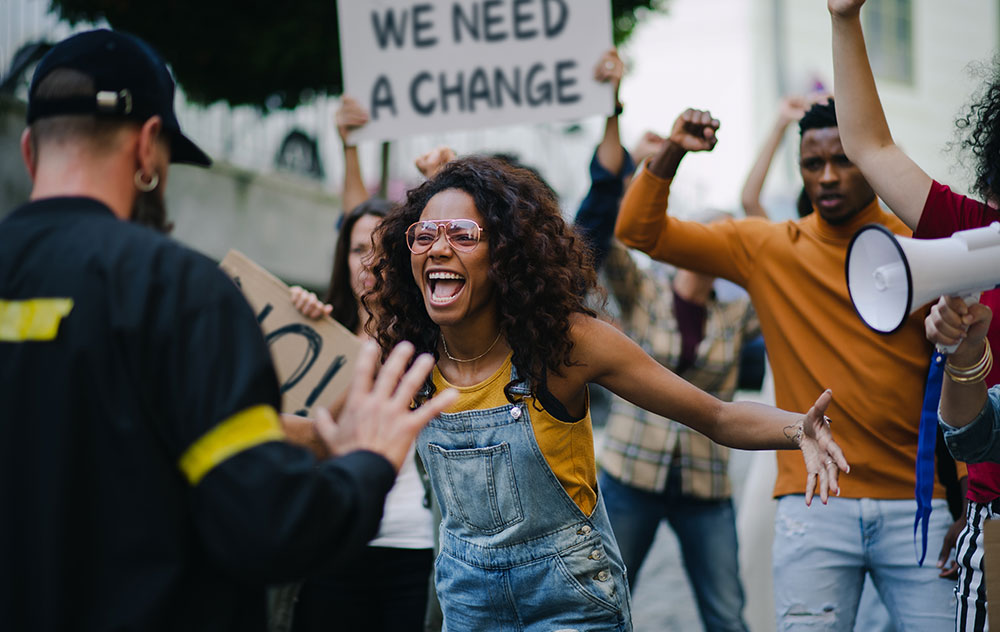 We often hear people talk about civil liberties and civil rights and how they are being violated, but do you actually know what they really are and what they afford you as an American? Simply put, they are the personal rights that are guaranteed by the U.S. Constitution and other federal laws enacted by Congress. They are designed to recognize the free-decision making required for individual autonomy and provide all Americans equal social opportunities and equal protection under the law regardless of race, religion, gender, age, or other personal characteristics. Aside from the rights and liberties expressly spelled out in the Bill of Rights, they include things like the Civil Rights Act of 1871, the Civil Rights Act of 1964, and the Americans with Disabilities Act of 1990.
We often hear people talk about civil liberties and civil rights and how they are being violated, but do you actually know what they really are and what they afford you as an American? Simply put, they are the personal rights that are guaranteed by the U.S. Constitution and other federal laws enacted by Congress. They are designed to recognize the free-decision making required for individual autonomy and provide all Americans equal social opportunities and equal protection under the law regardless of race, religion, gender, age, or other personal characteristics. Aside from the rights and liberties expressly spelled out in the Bill of Rights, they include things like the Civil Rights Act of 1871, the Civil Rights Act of 1964, and the Americans with Disabilities Act of 1990.
In the U.S., federal and state law has been enacted to prohibit discrimination based on protected-class characteristics (such as race, color, religion, creed, national origin, ancestry, gender, sexual orientation, pregnancy, age, disability, etc.) when it comes to things like education, employment, access to public assistance and facilities, housing, or healthcare, just to name a few. The great thing about our Constitution and our system of laws is that it’s possible to make changes over time to correct or add things the original framers didn’t necessarily take account of or which were against social norms in the 1700s. One big example is slavery, which was still legal in 1776 and widely practiced in the South. That civil rights change only came about because of the Civil War and even then people have had to continue to fight so that people of color would eventually be given the same rights and the same treatment as others. Other civil liberties and civil rights have been secured either by new legislation or court cases providing precedence. But all of these require continued vigilance and enforcement through litigation.
What’s the difference between civil liberties and civil rights?
 While the term “civil rights” generally refers to a broad scope of civil liberties and civil rights that persons in this country possess by virtue of restraint on our government, technically speaking, there are differences. Civil liberties specifically refer to basic freedoms enshrined in the Bill of Rights that create a space of freedom in which government actors are not supposed to encroach upon, while civil rights include not only space within which governmental actors should not encroach, but also affirmative laws that impose practical requirements to protect from discrimination. Many of your civil liberties are guaranteed by placing limits on what the government can do to you, such as limit your freedom of speech or imprison you without proper cause. Other civil liberties include the right to privacy, the right to remain silent, the right to a fair trial, and the right to vote, something that both women and people of color had to fight for as they were not similarly recognized in the original Constitution. Most recently, the LGBTQ community fought to guarantee the right to marry for same-sex couples, a civil liberty the original framers would likely not have ever formally considered.
While the term “civil rights” generally refers to a broad scope of civil liberties and civil rights that persons in this country possess by virtue of restraint on our government, technically speaking, there are differences. Civil liberties specifically refer to basic freedoms enshrined in the Bill of Rights that create a space of freedom in which government actors are not supposed to encroach upon, while civil rights include not only space within which governmental actors should not encroach, but also affirmative laws that impose practical requirements to protect from discrimination. Many of your civil liberties are guaranteed by placing limits on what the government can do to you, such as limit your freedom of speech or imprison you without proper cause. Other civil liberties include the right to privacy, the right to remain silent, the right to a fair trial, and the right to vote, something that both women and people of color had to fight for as they were not similarly recognized in the original Constitution. Most recently, the LGBTQ community fought to guarantee the right to marry for same-sex couples, a civil liberty the original framers would likely not have ever formally considered.
Affirmative civil rights laws beyond those contained in the Constitution, such as Title VII, are designed to protect people from discrimination in not only the public sphere, but also the private sphere. For example, an employer (whether government or private corporation) can’t lawfully choose to promote only the men in the company, or layoff people just because they are over 50. Women can no longer be fired or denied promotions for getting pregnant; in fact, employers must accommodate pregnant women in the workplace. Your doctor can’t deny you medical care because they don’t like people of your race. And schools must provide a free education to all children in the U.S. and can’t segregate them into different schools. This is an example of a right that was won by a court case in 1954, Brown v. Board of Education.
Fighting for your rights
Fighting for our civil rights, broadly, is something we all must continue to do because our system of governance requires vigilant recognition of the boundaries of our common rights and increasing recognition of rights needed to address marginalized people in our society, methods of ensuring fair and equal treatment under the law, and enforcement through lawsuits, because, unfortunately, not everyone follows the law. Much of the civil rights fight happens in the political world, through voting, protests, and other methods of speaking out. The death of George Floyd in May 2020 brought about huge civil rights protests in many U.S. cities. Those protests brought about change and many states have passed new laws, such as requiring the police to wear cameras to accurately record what they do. As lawyers, we support, but cannot directly assist with political efforts. But when it comes to enforcement of the law, we have the tools necessary to sue, for example, employers that continue to find ways to discriminate and government agencies like police departments that continue to violate people’s civil constitutional rights on a daily basis. We are 100% dedicated to using the law to enforce your civil liberties and rights from those who would seek to violate them. We broadly refer to these collection as civil rights.
We can fight for your civil liberties and civil rights
If you feel that your civil liberties or civil rights have been violated, we may be able to help. Whether your rights were violated by means of discrimination, police misconduct, or any other manner, it’s important for you to contact an attorney that specializes in civil rights as soon as possible. Many claims have a statute of limitations or other procedural deadlines that waive your right to sue if you wait too long, so time is of the essence. The Civil Rights Litigation Group has handled many civil rights and civil liberties cases and we offer free consultations so you can find out if you have a legitimate case and/or if the attorneys here may be a good match to represent you in your case.
Call the Civil Rights Litigation Group at (720) 515-6165 or use our online contact form to schedule your free consultation with us today.

